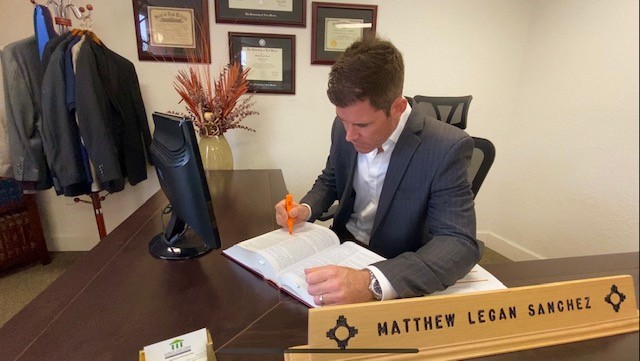
New Mexico child custody laws for unmarried parents
FAQS ON CHILD CUSTODY DURING A DIVORCE CASE IN ALBUQUERQUE, NEW MEXICO
All child custody questions are not created equally.
Some child custody questions are one of a kind and come from a unique situation or fact pattern. Other child custody questions involve common situations that overlap and are cut from the same cloth.
Here are some of the common child custody questions that I’ve encountered over the past decade of family law experience.
What is the difference between legal custody and physical custody in New Mexico?
Although legal and physical custody are often used interchangeably, let’s examine the differences.
Legal custody:
- Means the right to make decisions about the child’s education, health care, religion, and extra-curricular.
Physical custody:
- Means the child’s timesharing/visitation schedule with each parent.
- People often use the term joint physical custody to mean 50-50 timesharing. Joint physical custody means that both parents have timesharing with the child. New Mexico courts often use the phrase “shared physical custody” in lieu of “joint physical custody.” For instance, the couple could have joint/shared physical custody, yet one parent can have 85% of the time and have primary physical custody.
- Sole physical custody means that one parent exclusively has the child.
What is the difference between joint legal custody and sole legal custody in New Mexico?
Joint legal custody is a shared arrangement and with shared decision making ability. Sole legal custody means that one parent has the exclusive right to make decisions on a child’s behalf.
New Mexico courts presume that it is in the child’s best interests for the parents to share joint legal custody and share in the decision-making process. This means that one parent is unable to unilaterally make decisions regarding the child’s education, religion, medical/dental, and extra-curricular activities without the other parent’s approval.
New Mexico’s “presumption” for joint legal custody is rebuttable. This means that the court can award sole legal custody, in extraordinary situations, based on the evidence that overcomes the presumption for joint legal custody.
Can parents decide child custody out of a Albuquerque, New Mexico court?
Absolutely. In fact, Albuquerque, New Mexico courts prefer for parents to co-parent and resolve child custody issues outside of court. A parenting plan is a court enforceable contract between the parties that defines the co-parenting relationship and ideally includes the following:
- Legal custody;
- Timesharing with specific hours for exchanges;
- Exchange location;
- Holiday timesharing that includes day and hour;
- Dispute resolution;
- Status quo activities;
- Child support; and
- Tax deductions.
Assuming that the parents can agree on these issues, this agreement can be reduced to a parenting plan and filed with the court.
How do New Mexico courts determine child custody?
New Mexico courts are guided by a child’s “best interests” when determining parental rights and responsibilities. Ultimately the court is child centered and does what is best for the child involved. New Mexico considers 14 best interest factors that are balanced when determining the child’s best interests relating to custody:
- The child’s parent or parent’s wishes regarding custody;
- The child’s wishes regarding custody;
- The child’s interaction and interrelationship with is parents, sibling and any other person who may significantly affect the child’s best interests;
- The child’s adjustment to home, school, and community;
- Each party’s mental and physical health;
- Has the child established a close relationship with each parent;
- Are both parents capable of providing adequate care for the child throughout each period of responsibility, including arranging for the child’s care by others as needed;
- Are both parents parent willing to accept all responsibilities of parenting, including a willingness to accept care of the child at specific times and to relinquish care to the other parent at specified times;
- Can the child best maintain and strengthen a relationship with both parents through predictable, frequent contact and whether the child’s development will profit from such involvement and both parent’s influence;
- Are both parents able to allow the other to provide care without intrusion, that is, to respect the other parent’s parental rights, responsibilities, and right to privacy;
- Is the parent’s agreement regarding a parenting plan suitable?
- Geographic distance between the parents’ residences;
- Parents willingness or ability to communicate, cooperate, or agree on issues regarding the child’s needs; and
- Was there a previous finding of domestic abuse against the child, parent of the child, or other household member?
The 14 factors above are considered and balanced when determining a child’s best interests regarding legal and physical custody. The 14 factors ultimately determine the child’s best interests regarding child custody in New Mexico.
Can I file for child custody in New Mexico when Mother and Father live in different states?
You can file an initial child custody case in New Mexico when the child has lived in New Mexico for six consecutive months immediately before the custody case is opened, and a parent still remains in New Mexico. You may also file in New Mexico when the child was born in the state, but is not six months old.
I recently moved to New Mexico, can I file my child custody case in NM?
Maybe. The Uniform Child Custody Jurisdiction and Enforcement Act (UCCJEA) specifically addresses New Mexico’s jurisdiction over your child. Generally New Mexico can exercise jurisdiction when:
- New Mexico is the child’s “home state” when proceedings are initiated; 40-10A-201.
- If your child is now absent from NM and the child lived with a parent in NM for at least six months immediately before the child custody case was opened and one or both parents still live in NM; 40-10A-102;
- For a child less than six months of age, the child has lived in NM from birth; 40-10A-102.
- No other state has home state jurisdiction;
- A home state has declined jurisdiction because NM is a more appropriate forum and (1) The child and the child’s parents, or the child and at least one parent, have a significant connection with NM other than mere physical presence; and (2) Substantial evidence concerning the child’s care, protection, training and personal relationships are available in NM; 40-10A-201; or
- All other courts who could exercise jurisdiction have declined to do so and NM is a more appropriate forum. 40-10A-207.
Can my child decide which parent he/she wants to live with in Albuquerque, New Mexico?
A child’s wishes and concerns regarding child custody should always be considered by a New Mexico court. Generally, a child’s desires are given more weight as the child grows older.
In Albuquerque, New Mexico, when a child is 14 or older, the court must consider the child’s wishes. This requirement to consider the child’s wishes does not mean that the court must follow the child’s wishes. The child’s wishes will be considered among other relevant factors, when reaching an ultimate determination regarding the child’s best interests.
Albuquerque courts generally allow children that are 16 and older to “decide with their feet” regarding timesharing. In doing so, Albuquerque, New Mexico courts are realistic that the child is quickly approaching emancipation, and resistance can be futile.
What happens if my child wants to talk to the judge about custody? Can I bring my child to court? Can my child write a letter to the judge in New Mexico?
Most New Mexico courts heavily frown on child testimony and direct court involvement. It is generally agreed that having a child “choose” one parent over another, even if the child desires to do so at the time, can be extremely harmful to the child’s long term development. For this reason, Albuquerque courts generally never allow a child to become directly involved with a child custody case, and almost never will speak with the child “in camera.”
Instead, New Mexico courts often use the following indirect methods to hear a child’s voice:
- Through Court Clinic (AKA PR Solutions, Advisory Consultation) with mild to moderate cases;
- Appoint a Guardian Ad Litem to serve as the court’s arm to determine the child’s best interests with contentious and difficult cases; or
- Appoint an 11-706 expert witness to conduct a child custody evaluation with severe, longstanding, and/or complex custody disputes.
New Mexico courts prefer one of these indirect methods of hearing a child’s voice, rather than having a child directly speak with a judge, or testify in court.
How do I change my parenting plan or custody order in Albuquerque, New Mexico?
Parenting plan and custody orders may be labeled as “permanent” but are not forever written in stone. In New Mexico, timesharing and custody orders can be modified based on a “substantial and material change in circumstances affecting the welfare of the child.” Although this material change is not described by statute or case law, some trial judges have agreed that the following show a major change in circumstances:
- Substantial passage of time;
- Developmental changes with child (i.e. entering grade school);
- Remarriage;
- Relocation;
- Disability or illness that directly affecting a parents ability to care for the child;
- Major change in work schedule; or
- Finding of abuse or neglect.
Who gets to claim the child as a dependent on their taxes?
New Mexico courts generally follow federal law, IRS Publication 501 and allow the parent with 51% of timesharing or more to claim the child as a dependent for tax purposes.
Can the parent with primary custody move away with the children?
No. Parents have a constitutional right to travel and relocate. Parents, however, do not have the right to move remove children from their home state of New Mexico. It is always the best practice for the custodial parent to either get permission from the other parent, or from the court to relocate. This is the best practice even when a parent has sole legal custody, or child custody has never been established by court order. This is especially true when a court order directly states that a parent must receive written permission before relocating.
Failing to receive either parental permission for the relocation, or court permission could result in the court ordering the parent to return to New Mexico with the child. This can cause considerable expense if the parent has already moved to another state. This can also demonstrate bad faith actions that adversely affects one’s case.
The parent that desires to relocate must demonstrate that the move is in the child’s best interests. The court will generally determine the child’s best interests through the following means:
- Risk Relocation Assessment through Court Clinic (or equivalent);
- Guardian Ad Litem evaluation and recommendation;
- 11-706 evaluation and recommendations; or
- Evidentiary Hearing where assigned judge makes decision.
Can I refuse parental visitation if the other parent stops paying child support?
No. Child support and child custody are two distinct issues. Withholding parental visitation could be deemed to be a violation of the court’s order and could adversely affect one’s timesharing.
In situations where a parent refuses to follow a child support order, a parent can:
- File a Motion to Enforce or Motion for Order to Show Cause; or
- Seek Wage Garnishment/Wage Withholding;
Can we get a mediator to help us resolve our child custody dispute?
Absolutely. Mediation is also known as settlement facilitation and routinely ordered to take place before the court will address child custody issues. The settlement facilitator (mediator) is generally an experienced attorney with a deep understanding for the issues involved. A good facilitator is skilled at guiding the parties towards a resolution that is similar to what one would expect to receive through litigation.
(505) SANCHEZ is here to answer all of your child custody during a divorce case questions in Albuquerque, New Mexico
Do you have questions about your child custody during a divorce case issue in Albuquerque, New Mexico? Understanding the child custody laws in Albuquerque, New Mexico requires an experienced family law attorney that knows child custody laws. Matthew Legan Sanchez is one of the top rated child custody lawyers in Albuquerque. Sanchez can be reached by calling (505) SANCHEZ.

Albuquerque child custody lawyer — Matthew Legan Sanchez






